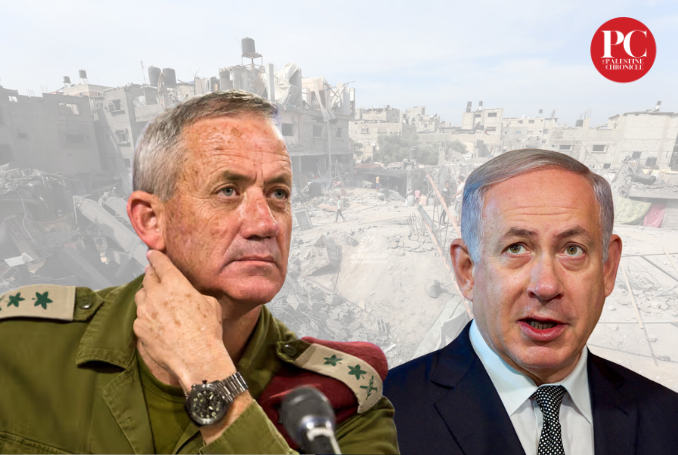
The Israeli threats came in line with a series of violent strikes that hit Beirut’s southern district Sunday night.
Israeli opposition leader Benny Gantz urged on Sunday Benjamin Netanyahu’s government to expand its strikes to include Lebanese government facilities in Beirut, which have so far been spared from Israel’s relentless war on the country.
“The Lebanese government is allowing Hezbollah to operate freely. It’s time to take strong action against its infrastructure and assets,” Gantz said on the X platform.
Echoing Gantz’s statement, Israel’s Maariv newspaper’s military analyst, Avi Ashkenazi, proposed in an article on Sunday to target the Lebanese Parliament as a feasible option for the Israeli army.
The Anadolu news agency quoted Ashkenazi as saying that “the parliament building is part of Hezbollah’s political infrastructure and could serve as a refuge for its members”.
Death Toll Reaches 3,670 – Israel’s War on Lebanon Continues
The former Israeli army officer also suggested that the Israeli army might consider targeting other objectives, such as hitting 10 to 20 additional buildings in the southern district of Beirut “to ensure dominance in the area,” Anadolu said.
The Israeli threats came in line with a series of violent strikes that hit Beirut’s southern district Sunday night.
The Lebanese National News Agency (NNA) reported on Sunday that a series of violent raids have targeted Haret Hreik, Bir al-Abed, Ghobeiry, Moawad, and Choueifat-Amrousieh in the southern district of Beirut, which were heard in different parts of the capital and Mount Lebanon.
“The southern suburb of Beirut is subjected to a fire belt, as thick black smoke covers the sky,” according to NNA.
Dozens of Rockets Launched from Lebanon – Hundreds of Thousands in Shelters
‘Dying under Bombardment’
These developments were preceded by meetings in Beirut between Josep Borrell, the outgoing European Union High Representative for Foreign Affairs and Security Policy, Lebanese Prime Minister Najib Mikati, and the Speaker of the Lebanese Parliament, Nabih Berri.
“I chose to conclude my mandate and mission here in Lebanon, in Beirut, because what is happening in the Middle East, and particularly here in Beirut, is putting the entire international community to the test and we really have to see if we are willing and able to make peace,” Borrell was quoted as saying by NNA.
“This conflict has taken on an international dimension and the international community cannot remain inactive in the face of what is happening here,” he added.
Using the Gaza Playbook in Lebanon – How Words Can Justify a Genocide
“The lack of peace in the Middle East has become very high and unbearable. People are dying under bombardment.”
Borrell highlighted the high death toll and the destruction the country has sustained since Israel launched its war on Lebanon, stressing that the number of those killed in this war is three times higher than that in 2006, NNA said.
Touching on the ongoing genocide in Gaza, the EU official voiced his regret over the incapacity of the EU to stop the “suffering and grief” of Palestinians in the Strip, while stressing that the international community should exert all efforts to stop “this tragedy that happened in Gaza and Lebanon.”
Moreover, Borrell reiterated the pivotal role of the United Nations Relief and Works Agency (UNRWA), which he said is an “unparalleled role in Gaza and Lebanon”, stressing that “any other party cannot provide the services UNRWA provides to half a million Palestinian refugees.”
The EU official slammed Israel’s banning of the UN agency in the occupied Palestinian territories, urging it to reconsider its position.
Furthermore, Borrell concluded his statement by asserting that the decisions by the International Criminal Court (ICC) “are not political.”
“They were taken in accordance with international law and must apply to everyone. We strongly support the International Criminal Court,” he was quoted as saying by NNA.
Why Israel Started the War with Lebanon, Not Hezbollah – ANALYSIS
War on Lebanon
Since the start of the Israeli war on Gaza, on October 7, 2023, the Lebanese movement Hezbollah has engaged directly, but relatively in a limited way in the war against the Israeli occupation.
Israel escalated its aggression with the cyber-terror attacks on September 17 and 18, which claimed the lives of at least 37 people including children, and injured around 3000 others.
This went hand in hand with a series of assassinations of Hezbollah leaders, including that of the Secretary-General of the resistance party Hassan Nasrallah on September 27.
These developments coincided with unprecedented bombings and airstrikes by Israel’s army on different cities across Lebanon particularly in the south, Bekaa and the southern district of Beirut.
The Lebanese Ministry of Health announced on November 24 that 3,754 Lebanese were killed and 15,626 were injured since the beginning of the Israeli aggression on Lebanon.
Gallant Calls for ‘Painful Concessions’ – Israel Faces Mounting Losses in Gaza, Lebanon
The Lebanese Government Emergency Committee announced on October 29 that the number of shelters has reached 1,100 centers with maximum capacity.
The Head of the committee, Minister of Environment Nasser Yassin revealed that the total number of displaced people exceeds 1.2 million.
According to the committee, 355,910 Syrian nationals and 167,295 Lebanese nationals crossed into Syria from September 23 to October 29.
(PC, Agencies)
